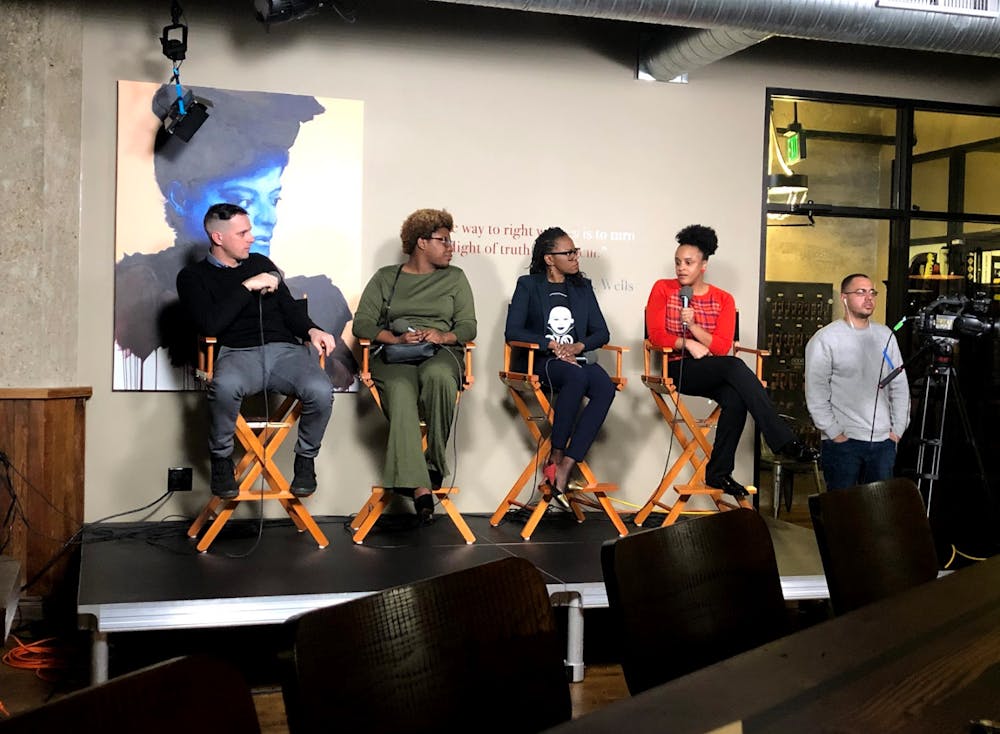Ida B’s Table, a restaurant in downtown Baltimore, hosted a public forum titled “Real Talk Tho: Making Public Transportation More Equitable” on Tuesday. Three panelists spoke at the forum, which focused on issues of public transportation in Baltimore: Ryan Dorsey, councilman for Baltimore’s 3rd District; LaKeisha Henderson of Bike and Brunch Tours; and Makayla Jefferson, a senior in the Baltimore City Public Schools (BCPS).
Henderson discussed the lack of options in Baltimore for those reliant on public transportation.
“There are not enough equitable solutions for people who must depend on public transportation to get from their front door to their preferred mode of transportation,” Henderson said.
Jefferson, who stated that she has been an avid bus rider since the fifth grade, explained that she has seen all kinds of dangerous behaviors and advocated for more attention to security within the broader public transportation system.
“I see people doing drugs; I see people being very creepy; I’ve seen homeless people; I’ve seen people puking on the bus,” Jefferson said. “Safety on the bus should be more of a conversation.... Safety should be recognized and more of a priority. I have friends who have been sexually assaulted on the bus. I have been followed after leaving the bus on the way to school.”
Jefferson also brought up times where her friends were forced to cancel plans or skip out on school or extracurricular events due to unreliable buses or a lack of bus fare.
“My friends on the other side of town can’t meet up because the bus doesn’t run late at night, or it only comes once an hour, if that,” Jefferson said. “If people have to catch the bus, they often quit or just stop coming to work because the bus is so unreliable.”
Jefferson argued that this unreliability results in high unemployment rates, which contributes to a cyclical status of unemployment and poverty.
Dorsey agreed, adding that unreliable public transportation causes those dependent on it to be at a disadvantage in the job market.
“If you have a car, you have access to 100 percent of the jobs available,“ Dorsey said.
He explained that this is in sharp contrast to the many people who do not have cars and are subsequently restricted from the majority of available employment.
Dorsey stated that part of the transportation inequity in Baltimore stems from the city’s legacy of redlining. The system of redlining in Baltimore was a government-endorsed system of marking neighborhoods higher or lower quality; these distinctions were heavily dependent on race and class.
Dorsey explained that one proposed method to combat the inaccessibility of public transport was to create a new mass transit light rail line, called the Red Line, to augment the existing lines and serve black low-income neighborhoods. In 2015, however, Governor Larry Hogan cancelled the Red Line project.
Henderson expressed her belief that those with legislative power should listen to their constituents, rather than just looking at numbers and statistics, since there is not a single solution for everyone.
“It’s not about telling people what they need, but about listening and understanding what people need, having people speak for themselves and what they want,” she said. “There is a conversation about the ‘good’ spaces and ‘good’ solutions, but everybody has a different ‘good.’”
Dorsey stressed a de-emphasis on private cars, criticizing the fact that private cars are allowed to park on many public streets in Baltimore. Dorsey also advocated for divestment from cars, arguing that they supported fossil fuel infrastructure.
“We are willfully giving over public space to private storage of automobiles that are burning fossil fuels, which are poisoning our air, killing our pedestrians at a higher rate than ever,“ Dorsey said. “We continue to prioritize our public space for the least economic, least effective, least equitable mode of transportation in all of human history.”
Dorsey added that, in addition to issues with the public transportation systems, Baltimore City lacks sidewalks compliant with the American Disabilities Act (ADA), making it difficult for disabled individuals to use them as a mode of transport.
“Ninety-five percent of the city is not ADA-compliant. It’s an abysmally low level of meeting people’s needs, all people’s needs,“ Dorsey said. “If you’ve ever walked down any block in Baltimore, in all but a handful of neighborhoods, you’ve experienced a ‘no stopping’ sign obstructing the sidewalk, a PG&E pole obstructing the sidewalk, a city streetlamp obstructing the sidewalk, scooters or bikes obstructing the sidewalks.”





